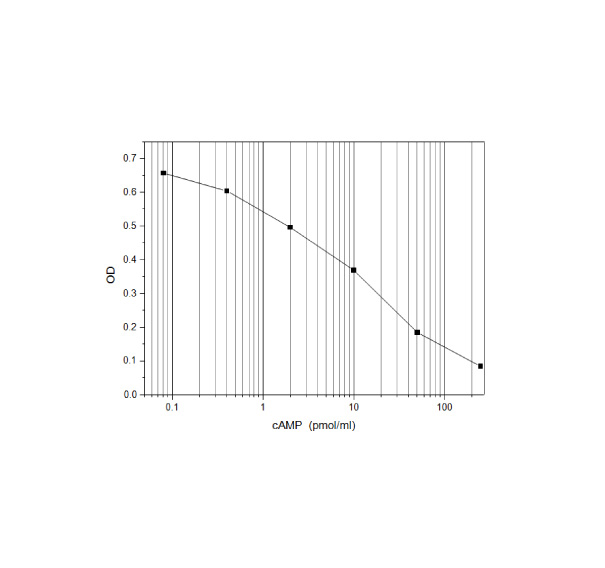Product Highlight
- Based on the unique mouse monoclonal cAMP antibody
- The only assay kit on the market with monoclonal cAMP antibody
(all other kits are based on polyclonal cAMP antibodies)
- The monoclonal cAMP antibody displays much higher selectivity over cGMP and ATP than polyclonal cAMP antibody
- Avoids the batch-to-batch variations associated with polyclonal antibody productions from animals, thus providing the reproducibility
Product Description
Adenosine 3′, 5′-cyclic monophosphate (cyclic AMP; cAMP) modulates various physiological functions such as cardiovascular biology, learning and memory, olfaction, immune response, asthma and kidney function (1,2). cAMP is produced from ATP by adenylyl cyclases and is degraded by phosphodiesterases. Stimulation of adenylyl cyclases or inhibition of phosphodiesterases can increase cellular cAMP concentrations. Blockers of adenylyl cyclase-activating receptors and inhibitors of the cAMP-specific phosphodiesterases are used for treating human diseases. For example, blocking agents for cAMP-increasing beta-adrenergic receptors (beta-blockers) are used for treating abnormal heart rhythms, high blood pressure (hypertension), myocardial infarction and heart failure. Inhibitors of cAMP specific phosphodiesterase types 2 and 4 are being tested for cognition enhancement.
To screen for inhibitors or stimulators of cellular cAMP levels, it is essential to have a sensitive, selective and reproducible method to measure the cAMP concentrations. This is especially true for the initial screenings given the possible weaker effects of larger pools of compounds.
Currently available other ELISA kits measuring cAMP levels are based on the non-affinity-purified polyclonal cAMP antibody. Despite the claimed selectivity, these polyclonal cAMP antibodies display certain cross-reactivity with ATP. Given that ATP is the substrate for the cAMP production, it is very desirable to have an antibody with high specificity towards cAMP over ATP.
NewEast Biosciences cAMP ELISA kit is based on the unique mouse monoclonal cAMP antibody. This monoclonal cAMP antibody displays >108 fold of selectivity over ATP, cGMP, and other nucleoside analogues. NewEast Biosciences cAMP ELISA kit provides significantly improved sensitivity and selectivity over other kits based on polyclonal cAMP antibodies. Our monoclonal cAMP antibody-based ELISA kit also avoids the batch-to-batch variations associated with polyclonal antibody productions from animals, thus providing the reproducibility in the long run.
Principle Outline
NewEast Biosciences cAMP ELISA Kit is a competitive immunoassay to measure the cAMP levels, either from cell extracts or from in vitro adenylyl cyclase assays. Briefly, multi-well plates are coated with goat-mouse serum. cAMP in cell extracts or in in vitro adenylyl cyclase assays will competitively bind to the monoclonal cAMP antibody in the presence of fixed amounts of cAMP-conjugated horse-radish peroxidase or alkaline phosphatase. Known amounts of cAMP are used as standards to generate the calculation curve. After a short incubation, the excess reagents are washed away and substrate is added. The multiwell plates are then read on a microplate reader at 450 nm or 405 nm. The intensity of the yellow color is inversely proportional to the concentration of cAMP in samples. The measured optical density is used to calculate the concentration of cAMP in samples based on the curve from the cAMP standards.











